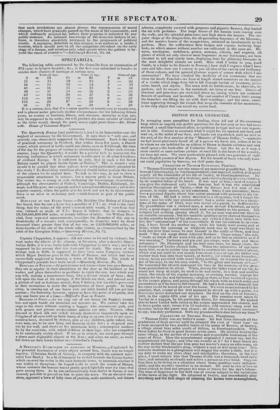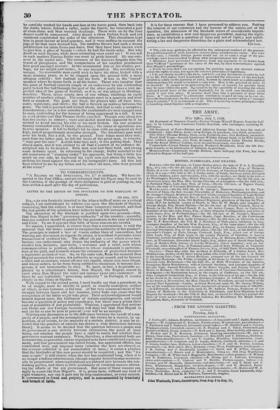BRITISH RURAL CHARACTER.
le arranging some pamphlets for binding, there fell out of the enormous heap which an inquiry into public questions for the last year or two had accu- mulated, a small blue-backed affair, insignificant in type and not very import-•
ant in title. Curious to ascertain what it might be, we opened and read, and read on, in the midst of our dust, and hands not unpolluted, until we read to the end, of the first number of the "Memoirs of Thomas Dolby ,"—memoirs we had never previously heard of, of a person we know not, unless it be he to whom we are indebted for an edition of Hume in double colonies and very •
small space—time bookseller of Catherine Street. Let this be as it may, a• Inure candid or more curious picture of rural life in the heart of the country,. we have not seen. We were particularly pleased with two portraits of right down English yeomen of low degree. For the benefit of those who only know: our rural population by hearsay, we shall quote them.
CHARACTER OF Trrottaa PLOWRIG DT, Thatcher.
" Thomas Plowright was the name of my maternal grandfather. 13a evama born at Fotheringhay, in Northamptonshire; but married, settled, are' spent: nearly all the remainder of his life at Yaxley, in Huntingdonshire: He followed time occupation of a thatcher, ands-eared a family of seven ehildrea by the unaided labour of his hands. It was said of him,—and of course I can give the statement only from hearsay, but it was the established opinion throughout all Yaxley,—that lie always had the sum of ten pounds, in ready money, at his command. Since I can remember, there was a personal dignity about him rather unusual with persons in his sta- tion of life. He bad a sister married to a clergyman, but I ferget time name ; and his wife (my grandmother) had a sister marrieet to a clergy- man of the name of Dove, who was rector of a parish in 13edfordshire. My grandfather was a shrewd man, a most devout Christian, an early riser, a good singer, and remarkably neat and cleanly in his person. His religion had nothing gloomy about it, for no man was merrier than he on suitable occasions ; but his sociable qualities never shewed themselves. in the maudlin brawls of the alehouse, nor (which I think very little bet- ter) the' outpourings" of the conventicle. It was his custom in an even- ing, I have heard my mother say, while his family were young and at home, when the spinning or whatever work was in hand was likely to • hold out later than usual, to seat himself in the midst of them, and sing twice "fine old songs about Admiral Benbow. Those songs," she said, ," made us finish off our work with glee, and go to bed as cheerful as if it was morning." Factories and gin and gin-shops, were then and there unknown ! Mr. Plowright and his four sons were, for many years, the - head ringers of Yaxley church bells. When the infirmities of age came • upon him, so as to render him unable to continue his accustomed labour,, which was not until he was nearly four-score years of age, my father area mother took him into their family, at Sawtry, (of which more hereaftere; where, being provided with every thing needful, he devoted the remain- der of his days, to use his own words, "to the glory and honour of Coe." He venerated the church and spent his time in the exercise of the •-..levoe.. tions prescribed in its ritual. When, during the latter years of his life, he • could not sleep at night, he used to lie and recite, in a firm and audible voice, the whole of the regular morning or evening service, (except the psalms for the day and thelessons,) singing three or four verses of a psalm in the proper places, and going through the whole with as much order and earnestness as if hewere in the church. He had a bed-room to himself, but his voice could be heard all over the house. We were so accustomed to hie practice, that, except at the first moment he struck up with a psalm, his. devotions never disturbed our slumbers. He died on the 21st of January, 1801, in the eighty-fifth year of his age. His remains were taken to Yaxley in a waggon, by his particular desire, for interment. He wished also to have Yaxley bells raised as his corpse approached the church, and • to have psalm xxxi, verses 9 to 13 inclusive, (old version) sung over his remains, before the grave was closed ; all which, it is scarcely necessary to say, was duly performed. Both my grandmothers died before my time.ls"
CHARACTER OF THOMAS DOLBY, Ploughman.
"Thomas Dolby was my father's name. He had risen through all the gradations of farm service until he attained the rank of 'head man' on . a farm occupied by two maiden ladies of the name of Brown, at Sawtry, a village about four miles south of Stilton, in Huntingdonshire. With. those ladies he lived in great favour seven years. My mother lived in the' same village, in the service of a wealthy and respectable tradesman of the' name of Prior. How the acquaintance originated I cannot say, but the acquaintance did begin ; and who can wonder at it ? for I have heard my • mother declare that she saw him pass her master's many an afternoon, on: his way to the blacksmith's shop, without a spot of dirt upon him ! This extreme neatness in a ploughman will stagger the reader a little, but it is' my duty to make my story clear and intelligible; therefore, in the first. place, I must inform him that Thomas Willy was a thorough-bred early• riser, and naturally as cleanly and active a person as ever lived. Suppose. him then to be living in a situation where those qualities were indispen- sable, and the mystery vanishes in an instant. He used to rise at two or.' three o'clock to feed and prepare his team or teams for the day's labour.. • The time of departure to the field was of course subject to the variations: of the dawn of day-light. He returned at twelve, and immediately after unyoking and the first stages of cleaning the horses were acuoznp,lishe4
he carefully washed his hands and face at the horse-pond, then back into the stable, where, behind a rafter, under the thatch, lay concealed a pair of clean shoes and blue worsted stockings. These were on by the time dinner could be announced. After dinner a clean fustian frock and red waistcoat constituted the order of the afternoon. This cleanliness kept him in great favour at head quarters, and it were endless to recount the jugs of ale that were decreed him. The maidens Brown had such a strong predilection for clean floors and stairs, that they have been known even to give him a glass of brandy I—when he had the tooth-ache. But why dwell on such themes, while more animating ones await me ? It was not in such matters Thomas Dolby was wont to pride himself. He was emi-
nent in the useful arts. The evenness of his furrows bespoke him the truest of ploughmen, and the compactness of his swathes proclaimed him great amongst mowers. In the ornamental line of his studies, per- haps, for his weight and inches, he was unequalled. His wrestling was unique. No reasonable man could wish to have his shins kicked with a more winning grace, or to be clapped upon the ground with a more obliging celerity : but football was his forte. It was in the' tented' meadow where he shone forth in all his lustre. Those who imagine that the game of football consists simply of an endeavour by one contending party to kick the ball through the goal of the other party have a very im- perfect idea of the game of football, as it is, or was played in Hunting- donshire. There, seven young men of one village, challenge an equal number of another village. The combatants meet in a spacious and level field or meadow. The goals are fixed; the players take off their hats, coats, waistcoats, and shirts ; the ball is thrown up midway between the goals. The ball is pursued and kicked about, but that is only a secondary consideration ; Mr in a few minutes the combatants are seen engaged man to man, contending for the honour of being uppermost in a fall. It was in work of this sort that Thomas Dolby excelled. Though only about five feet five inches in stature ; wary and skilful must his opponent be if he wished to avoid having his ribs or his neck broken. On one occasion Sawtry contended with (I think) Alconbury ; the scene of operations was Sawtry meadow. It fell to Dolby's lot to close with an opponent six feet high, and of proportionate muscular strength. The Alconbury man went over his head, like a doll, to the ground. Four times more they met ; each time my father said, he felt the boots of the great man, in transitu, "wipe past his ears." A sixth time they met ; it was getting dusk. They closed again, and it was evident to all that a contest of no ordinary de- scription was to be decided. Both men now lost their hold, and swung some distance apart. In returning to the charge, Dolby resorted to his old manceuvre of "running under" his opponent, but being a little too much on one side, he fractured his right arm just above the wrist, by striking his hand against the side of his antagonist's knee. All this has been related to me by my father and by other old men, who were present at the scene."



















 Previous page
Previous page